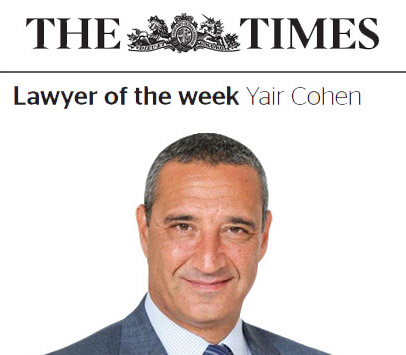How to remove director disqualification articles from Google
Director disqualification articles can remain visible online for years, hindering personal and professional recovery. However, under GDPR’s right to be forgotten, individuals can request the removal of outdated information, helping to restore their reputation and move on from past issues.
Restoring online reputation: addressing outdated director disqualification articles
How to remove director disqualification articles from Google is a pressing concern for many individuals who have been impacted by this issue. Director disqualifications, which are often widely publicised, can remain visible online for years, making it difficult for people to move on with their lives after the disqualification period has ended.
The continued presence of these articles in search results can overshadow personal and professional efforts to rehabilitate and rebuild, creating the impression that the individual is still affected by past issues. Many assume that these records are permanent, but that’s not necessarily the case. Under GDPR’s "Right to be Forgotten," it is possible to request the removal of outdated and irrelevant information from search engine results, providing individuals with a chance to truly leave the past behind.
Removing director disqualification from Google searches case study
Our client, *David Morris* (name changed for confidentiality), faced a significant challenge in restoring his reputation due to outdated articles appearing in Google searches. The articles, which highlighted his disqualification as a company director, continued to show up in search results long after the disqualification period had ended. This caused ongoing damage to *David’s* personal and professional reputation, as the articles overshadowed his attempts to move forward. Our goal was to help remove these outdated articles from search engines using GDPR's "Right to be Forgotten."
key issues with director disqualification articles from internet searches
Articles detailing director disqualifications are often published to serve the public interest, offering transparency around corporate governance and ensuring that directors who fail to meet legal and ethical standards are held accountable. These articles typically appear following the disqualification of a director and remain accessible to inform the public about the conduct of those in corporate positions. However, the issue arises when such disqualifications expire, as they did in *David’s* case, yet the articles remain indexed and publicly visible on search engines like Google.
This creates a situation where outdated information continues to affect individuals long after the relevant legal matters have concluded. Despite the expiration of the disqualification and the rehabilitation of the individual, Google and other platforms often resist removing such content due to a misconception that there is ongoing, never-ending public interest in retaining access to the information. Search engines generally default to maintaining content unless there is a clear legal argument or a pressing reason for its removal.
First step: preserving evidence of the disqualification articles
One of the most critical steps in this process was gathering and preserving evidence of the offending articles. We collected comprehensive records of the URLs from news sites and how they appeared in search engine results, particularly on Google, Bing, and Yahoo. Preserving this evidence is essential because it creates a documented trail that supports the legal argument for removal.
The importance of this step cannot be overstated, as it ensures that even if the URLs or search results change during the course of the case, we have a concrete record of the issue at hand. Proper preservation involves more than just saving links or taking screenshots; it requires meticulous attention to detail, including timestamps and capturing how the content appears across various devices. Doing this correctly ensures that when we present our case to the search engines, we have irrefutable evidence of the impact these articles are having on our client’s reputation.
Challenges in communicating delisting requests to Google and Bing
One of the most challenging aspects of this case, and many similar ones, is communicating the issue to platforms like Google and Bing in a way that compels them to act. Most individuals who submit delisting requests face rejection because these platforms follow strict internal guidelines. Caseworkers are trained to assess requests based on checklists, and any request that requires deeper analysis or a more nuanced understanding of the individual's circumstances is often rejected at first. This was the case for David. Despite the clear legal argument under GDPR’s right to be forgotten, Google initially refused our request. Search engines tend to err on the side of caution, prioritising public access to information, even when that information is no longer relevant. The refusal often stems from a misconception that there is a continuous public interest in retaining access to disqualification records, even after they have expired. This makes it easier for platforms to default to denial, as addressing the nuances of each case requires more effort and understanding.
Escalating delisting requests within search engines
We never take no for an answer when it comes to our client’s rights to have articles delisted from search engines whether under a right to be forgotten, defamation or privacy law. When our initial request was refused, we knew that escalation would be necessary. Platforms like Google and Bing often need to be pressed to reconsider their decisions, especially in cases involving nuanced legal arguments. Escalation involves pushing for the case to be reviewed by more senior personnel who have the authority to make decisions based on broader legal principles rather than just ticking off a checklist.
We escalated our communications by reinforcing the legal basis for the delisting, particularly focusing on the fact that the articles were outdated, the disqualification had long expired, and the continued presence of this information was causing disproportionate harm to *David’s* personal and professional life. Our goal was to ensure the case was handled by someone who could apply a more reasoned, detailed analysis.
Issuing a formal GDPR notice for delisting outdated content from Google
When escalating internally within the platform doesn’t yield results, the next step is to issue a formal GDPR notice. This is a critical legal document that carries significant weight. A GDPR notice outlines the legal breach—in this case, the improper processing of outdated and harmful personal information—and serves as a formal demand for the removal of the content. It functions similarly to a letter before action or particulars of claim, signalling that legal action is imminent if the matter is not resolved. A GDPR notice must be drafted carefully, addressing all potential objections and detailing the legal grounds for delisting. In David’s case, we emphasised that the disqualification information was no longer relevant, had expired from official registers, and that its presence online violated GDPR principles of data minimisation and the right to privacy.
Filing a legal claim to force delisting of outdated information
In rare instances where even a GDPR notice fails to achieve the desired outcome, filing a legal claim becomes the final recourse. In this case, platforms like Google often escalate the matter internally to their most senior legal counsel, who are more likely to reach a favourable resolution. The prospect of a legal battle and the associated negative publicity can be strong motivators for platforms to settle the matter before it reaches court. By filing a claim, we signal that the issue is being treated with the utmost seriousness and that we will pursue it until a satisfactory resolution is reached. This approach often forces platforms to reconsider their initial refusal and comply with the request for delisting.
Expanding the scope of delisting director disqualification articles
A common challenge in delisting cases is the scope of removal. Search engines are typically willing to remove URLs when they are associated with the client’s exact name, but problems arise when additional search terms—such as “disqualification” or “director ban”—are used. In David’s case, even after Google and Bing agreed to remove some results, searches that included additional terms still brought up damaging content.
Convincing search engines to expand the scope of delisting to include searches with additional terms is not straightforward. Platforms often argue that these combinations serve a public interest. However, by framing our arguments around fairness and proportionality, we were able to persuade Google and Bing to extend the delisting beyond just David’s name.
Solicitor’s thoughts on the case
Reflecting on this case, it was clear that our client’s primary challenge lay in overcoming Google’s resistance to removing articles relating to director disqualification. Disqualifications are serious matters, and transparency is vital while they are active. However, once they have expired, there is a strong argument that continued access to this information no longer serves any public interest and only harms the individual involved. The law recognises that people should be given the chance to rebuild their lives once they have served their penalties, and this principle underpins the right to be forgotten. We are proud of our persistent approach, particularly in escalating the matter within Google and ensuring that the case reached senior legal minds within the organisation. While it was disappointing that Yahoo maintained a more rigid stance, the successful delisting from Google and Bing significantly restored *David’s* reputation, which was the most critical outcome. This case demonstrates the importance of legal expertise in navigating complex and resistant platforms like search engines.
This case highlights the complexities of removing outdated information, particularly director disqualification articles, from search engines. While initial refusals are common, persistence, legal expertise, and a methodical approach can lead to success. Through careful evidence preservation, strong legal arguments, and escalation where necessary, we were able to delist the harmful articles from Google and Bing, restoring our client’s reputation and allowing him to move forward. Our firm specialises in addressing these challenges, helping individuals protect their privacy and restore their online reputations. If you are facing similar issues, we have the experience and knowledge to guide you through this complex process and achieve the best possible outcome.




